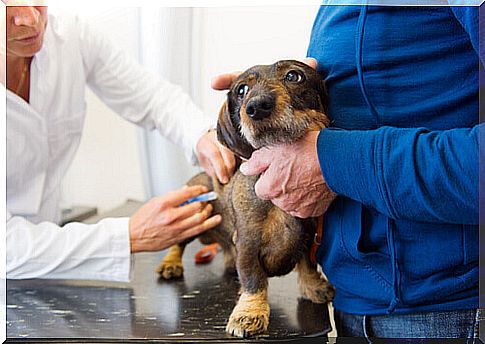What Mandatory Vaccinations Should I Give My Dog?

To prevent them from contracting certain infectious diseases, pets need to receive certain mandatory vaccinations. There are also other options, which change according to the animal’s geographic location and health status. In this article, we will tell you more about these treatments that act on the dog’s health status.
Mandatory vaccines and your dog’s health
Puppies begin to be vaccinated from 12 weeks of age (approximately). Before this step, maternal antibodies can block the effects. Therefore, dogs can be vaccinated as soon as they stop consuming their mother’s milk.

When you buy a dog, it is usually delivered with a vaccination booklet and a dose of some mandatory vaccinations. If the animal has been immunized, it cannot have contact with others, as it is more likely to be infected by diseases and infections.
When applying the vaccine, the dog receives a mixture of antigens for a specific virus. In this way, the organism must react and act on these microorganisms, so that they do not reproduce.
After vaccinating your dog, he may suffer a decrease in cellular immunity and get sick (as happens to people when they get vaccinated against the flu, for example). Despite the transient state of immunosuppression, it is essential that they are protected against viruses and bacteria. If in the future he comes into contact with the organisms causing the pathologies against which he was immunized, he will not be infected.
When a pet has been vaccinated, it is less likely to suffer from serious and even fatal illnesses. Furthermore, transmission to people is avoided, as in the case of rabies. Mandatory (and optional) vaccinations must be applied when the animal is healthy and in good condition. The side effects of vaccines are completely normal and even to be expected.
For example, a high fever may occur in the hours following the application, appearance of bruises, rash and itching, especially in the area where the needle was placed, and swelling may develop. In the latter case, this occurs if the animal did not remain still during the bite, or because the liquid from the injection did not flow into the blood. If this lasts for several days, we must take the animal to the veterinarian.
What vaccinations are mandatory for my dog
The vaccination schedule was developed by a regulation at the national level. Therefore, it is necessary to consult a veterinary clinic. Basically, mandatory injections protect dogs against distemper, parvovirus and rabies. As for optional vaccines, there are against leptospirosis, kennel cough, Leishmaniasis, among other pathologies.
The basic schedule of vaccines in dogs is composed of:
- First vaccine: 6 weeks of life
- Multipurpose: with 6-8 weeks
- Second dose of Polyvalent: 10-12 weeks
- rabies: 16 weeks
- Multipurpose and Rage: Annual Reinforcement

The polyvalent vaccine protects against the following diseases (which is why it is so important to increase the doses once a year):
- Distemper
- Canine Infectious Hepatitis (adenovirus 1)
- leptospirosis
- parvovirus
- Kennel cough (adenovirus 2)
- Canine Coronavirus
- parainfluenza
As for the rabies vaccine, the injection provokes an immune response against the virus, so the animal will be protected after 2 weeks of application. Effectiveness is 100%, if administered correctly, and lasts for 1 year. The second application usually lasts 2-3 years.







